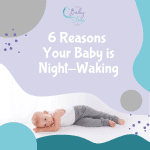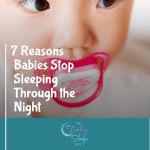
Why is baby waking at night? Is it hunger? Discomfort? Something else?
Use our checklist to figure it out!
Top 15 Reasons Why Baby Is Waking At Night
-
- Hunger: Newborns need to eat around the clock, but even older babies need one (or possibly two) feedings at night. We generally recommend an attempt to night wean around 9 months. Although we consider it normal for a baby to need one night feeding up to 12 months of age in some cases.
- Wet/Leaky/Dirty Diaper: There’s really no way to prevent wet or dirty diapers from waking your baby. But you can do something about leaky diapers that disturb your baby or toddler’s sleep.
- Sleep Associations: Rocking or feeding your baby to sleep isn’t necessarily a problem – that is until your baby needs you to re-create her sleep associations in order to fall asleep when she wakes between sleep cycles. For details about what sleep associations are, and how they form, browse through this article.
- Too hot/too cold: Your baby will obviously be uncomfortable if she’s too cold. But avoid the impulse to overdress your little one, too. Babies and toddlers (and adults!) tend to sleep restlessly when too warm. It’s best to keep your baby’s room at an optimum temperature for sleep. Want to know what babies and toddlers wear to bed? Read through this article.
- Sleep regression: Your child will go through about 4 or 5 sleep regressions in the first 2 years of life. Want to know when the regressions happen and how they affect sleep? Check out this sleep regression post.
- Teething: Growing a mouthful of teeth is hard (and sometimes painful!) work for a baby. Read this article for tips about how to handle teething and its effects on sleep.
- Illness: Despite your best preventative measures, your baby or toddler will sometimes get sick. During an illness, be prepared for your baby or toddler to wake often, and provide all the comfort you can.
- Napping too much: Long daytime naps are a good thing – until they interfere with night sleep. That’s when you know your baby is napping too much. Remember, your baby or toddler’s overall daily sleep amounts tend to stay the same. But, your little one will shift sleep from nighttime to daytime. So consistent long naps will mean less sleep at night. Check out this article for details on how many naps your baby or toddler needs, and how long they should be.
- Overtiredness at bedtime: While it may seem sensible to keep your baby up later at bedtime, in the hopes that she’ll sleep all night, the reverse is actually true. Babies who go to bed late tend to be overtired at bedtime and sleep worse than babies who go to bed early. Try shifting bedtime a bit earlier, to help with night waking that stems from overtiredness.
- Discomfort: Big things, like vaccinations, can cause discomfort. So can small things, like an itchy shirt tag. If your baby seems to be in pain, or highly agitated, see if you can pinpoint a source of discomfort.
- Digestive issues (like gas or reflux): Gas and reflux can be very painful for a baby, and will obviously disrupt sleep. Food allergies may be to blame. If that’s the case, try a change in diet. For more help with digestive problems, see your baby’s healthcare provider.
- Food allergies or sensitivities: Food allergies and sensitivities cause a whole host of problems for your baby or toddler – including sleep issues. For details, read this article. For more information about starting your baby on solid foods, check out How to Start Solid Foods with Your Baby.
- Nightmares or Night terrors (12+ months): This won’t apply to younger babies, but if your little one is 12 months or older, nightmares (or night terrors) may begin to disrupt nighttime sleep.
- Room is too bright: Our brains associate light with being awake. That’s why it can be a good idea to let your newborn nap in a bright room, to sort out day/night confusion. But once your newborn has days and nights sorted out, it’s best to keep your baby or toddler’s room dark during sleep.
- Room is too noisy: Despite conventional wisdom, you can’t teach a baby to sleep through noise. Some babies and toddlers are just light sleepers. Every little sound wakes them up! For these little ones, white noise machines and apps are crucial for good sleep.
Do any of these reasons baby is waking at night look familiar?








